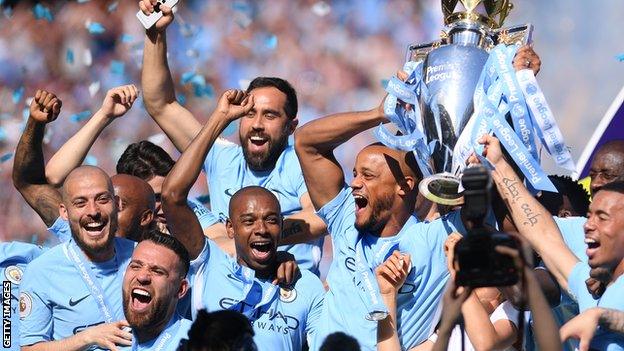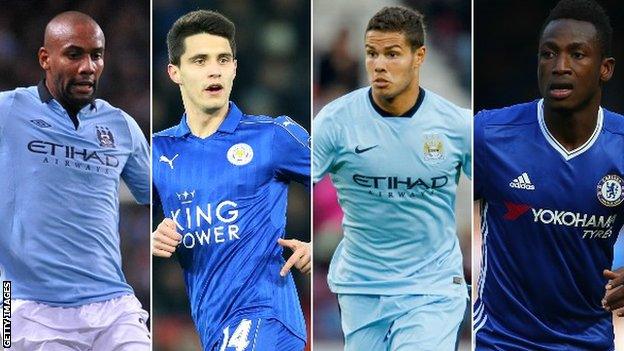Premier League: Why has it become so hard to defend the title?
- Published
- comments

Manchester City became the first team to reach 100 points last season
Manchester City smashed record after record in winning the Premier League title last season.
But will they be able to retain it? When the English top flight returns on Friday, Pep Guardiola's side will attempt to do what no team has managed since 2009 and record back-to-back title triumphs.
Prior to 2009 the Premier League was defended on seven occasions but in the subsequent nine seasons no team has successfully achieved the feat.
In that time Bayern Munich won the Bundesliga six times in a row, Barcelona claimed back-to-back Spanish titles on two occasions, Juventus won Serie A for seven straight seasons and Paris St-Germain lifted the French title four consecutive times between 2012 and 2016.
So why is it different in the Premier League? BBC Sport has identified some key areas which might be holding teams back.
Money talks - rivals outspend reigning champions
The Premier League's £5.14bn TV deal gives clubs unrivalled spending power compared with most of their European counterparts.
That means after failing to win the title, leading teams are able to strengthen significantly in the following summer to improve their chances in the next campaign.
In the nine seasons since the last successful title defence, by Manchester United in 2009, the defending champions have been outspent in the summer transfer window seven times by the team that went on to win the title.
The only exceptions were United in 2010-11 and Leicester in 2015-16, when the clubs spent just £21.87m and £34.38m respectively before winning the Premier League.
The overall trend suggests clubs have been guilty of standing still - in spending terms at least - and allowing others to overtake.
However, former Manchester United assistant manager Mike Phelan, who was at United when Sir Alex Ferguson's side won three consecutive titles between 2007 and 2009, said even during that period the club would never try to spend big on a significant number of players after a title win.
"When you get to that stage with a winning mentality and being champions, you have done something right - you have got a good group of players," Phelan told BBC Sport.
"What you need to do is back it up with one or two signings that would take you to the next level and change the dynamic of the team.
"It is about tweaking certain things. We would bring in the likes of a Juan Sebastian Veron, introduce one mega player."
Veron might not have worked out but that is far from an isolated case. Even finding that one difference maker has proved elusive in recent seasons...
Champions keep making mistakes in the market

Maicon, Bartosz Kaputska, Jack Rodwell and Baba Rahman were all signed in the transfer window after their club won the Premier League title
In the last six campaigns, Pedro and Marouane Fellaini are the only players signed by the defending champions who have made a lasting impression on their club's first team.
As for Maicon, Jack Rodwell, Baba Rahman and Bartosz Kapustka, the less said the better.
A trend has emerged of Premier League champions recruiting the wrong players between winning the title and beginning their defence.
In the summer of 2017, reigning champions Chelsea spent £186.03m on seven first-team players, many of whom had a difficult season, including Tiemoue Bakayoko, Davide Zappacosta, Danny Drinkwater and Alvaro Morata, and manager Antonio Conte grew frustrated at being unable to sign his first-choice options, external.
They made a similar mistake in 2015 when Rahman, Kenedy, Nathan, Matt Miazga, Asmir Begovic, Falcao, Papy Djilobodji and Michael Hector joined alongside Pedro.
A repeat of Leicester's success may have been unlikely but in the summer of 2016 the Foxes still spent £66.6m on Islam Slimani, Ahmed Musa, Nampalys Mendy, Kapustka and others, with few making much of an impact.
The Manchester clubs have also been culpable.
After their dramatic league win in 2012, Manchester City's summer outlay was £55.76m on players such as Maicon, Rodwell, Javi Garcia, Matija Nastasic and Scott Sinclair.
In 2014-15 when defending their title for the second time, City's signings - including Eliaquim Mangala, Bruno Zuculini and Bacary Sagna - again failed to make a serious impression.
In David Moyes' first season in charge of Manchester United, as the club defended the title won in Ferguson's final year in charge, Fellaini and full-back Guillermo Varela were the only summer additions, while back in 2009 they added Michael Owen, Antonio Valencia, Mame Biram Diouf and Gabriel Obertan to a title-winning squad.
'Other teams step up' - and motivation can be a problem
Ferguson is the only manager to defend the title on multiple occasions, having done so six times when in charge of Manchester United, and after his first triumph in 1992 he employed a trick to prevent his players becoming complacent.
"Sir Alex told the players the staff had written down the names of two players who they thought were satisfied with winning the Premier League," said professor Damian Hughes, a sports psychologist.
"But Ferguson told them that loyalty dictated they would be given the chance to prove him wrong.
"Gary Pallister says that every week he asked Ferguson whose name was on the envelope but Ferguson said he would only say at the end of the season.
"At the end of the season the team were walking around Wembley, having won the league and FA Cup double, and that question was still on the players' minds.
"Pallister asked Ferguson who was on the envelope and Ferguson said 'don't you get it? There were no names. If there were you wouldn't have been in that dressing room because dealing with complacency is more important than loyalty'."
Hughes, who has worked in football and has written a book called The Barcelona Way on the Spanish club's culture, also believes a successful squad needs "four or five" players who set standards to prevent any complacency.
"Look at Manchester United, Chelsea and further back Liverpool," he said.
"They had characters who drew a mental line at the end of every season to reset and go again.
"United had the likes of Ryan Giggs, Paul Scholes and Gary Neville who were serial winners and would drive the standards of the dressing room."
Former Chelsea striker Didier Drogba was part of the Chelsea team that won the club's first league title for 50 years in 2005 and followed it up a year later by lifting the trophy again.
Drogba admitted it feels "different" returning as defending champions but says successfully repeating the feat a year later was still a "big goal".
"You know that the teams you are going to face are more motivated than the previous season because they want to beat the champions so it brings out the best of them," he said.
"You notice the difference - the other teams step up."
The demands of playing in Europe
In recent years Leicester and Chelsea were both considered to have a significant advantage in their title races because they were not playing Champions League football.
The following season both clubs failed to repeat the success, with the increased number of games as a result of European competition viewed as a factor. Leicester played 43 matches in the 2015-16 season, compared to 54 in 2016-17 as they finished 12th, while Chelsea played 47 in 2016-17, increasing to 59 matches last season as they slipped to fifth.
Both clubs had consistent line-ups in their title-winning campaigns but had to make more than double the number of changes to their starting XIs a year later.
And European football also has a significant impact on preparation, as well as fatigue and injuries.
Phelan said that following a midweek Champions League fixture teams would often not have time for one full training session before a league match the following Saturday. The luxury of spending hours honing tactics for an away game against a team of set-piece specialists disappears.
"You could play on a Saturday, train on a Monday, travel to an away European game on the Tuesday, play on the Wednesday, travel back on a Thursday, have a recovery session on the Friday and then travel to a Premier League away game on the Friday afternoon," he said.
"The next time you take to the field you probably haven't had a full day's training and that's where the importance of the squads of the big clubs comes in."
If you are viewing this page on the BBC News app please click here, external to vote.
Will this season be different?
The trend of clubs trying to catch up by making big-money signings has continued this summer, with Arsenal, Manchester United and most notably Liverpool, who have recruited to the value of £171.55m, all outspending Pep Guardiola's side.
City broke their own transfer record to sign Riyad Mahrez from Leicester for £60m but Guardiola missed out on central midfielder Jorginho, who joined Chelsea from Napoli, with the Italian international's position reportedly a priority, external at the start of the window.
Guardiola also takes the mental aspect of the sport seriously. Former professional water polo player Manuel Estiarte is part of his backroom staff with the role of "looking at innovative ways to inspire the players", according to the club's website.
And City ended last season with a record buffer of 19 points over second-placed Manchester United, proving themselves the best team in the country by a distance.
Even with significant improvements from their rivals, that difference may prove too big to overcome in one season.
If ever the wait for back-to-back champions is going to end, the time is surely now.